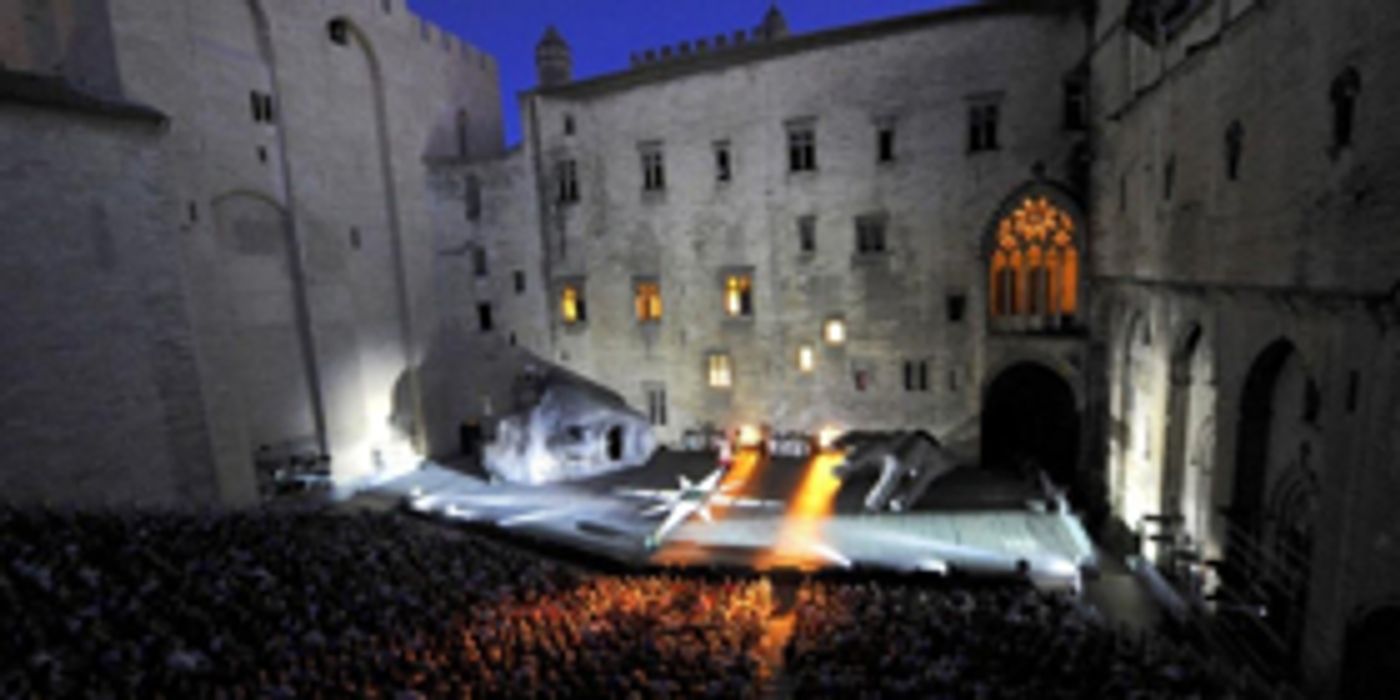Review: AVIGNON THEATRE FESTIVAL Presents THYESTE Directed By THOMAS JOLLY

In theatre there are few spaces as uniquely prestigious or complicated as The Avignon Theatre Festival's La Cour d'Honneur. Situated in the 14th century Palais des Papes, the immense open-air stage is backed by an imposing 100-foot stone wall. The wall comes unhelpfully pre-furnished with scenic elements such as a large gothic balcony and haphazardly placed windows. The work of any director must ultimately answer to such an imposing space. Amazingly, Thomas Jolly's modern staging of the Roman classic Thyeste finds a sonorous harmony within this medieval chasm.
Using Florence Dupont's stirring French translation of Seneca, Jolly's Thyeste is an essentialist presentation the plot. Conversation dies in the audience as a man enters from beneath a large disembodied hand stage left. He crosses the Cour's expanse blindfolded, traversing a star shaped grill center stage. Then, when he's stage right, he scales a monolithic tragedy mask. Once secure atop Thomas Jolly and Christèle Lefèbre's operatic scenography he bows an instrument, which ruptures the space with a rumbling soundscape. Tantalus appears from the bowels of Tartarus. "Qui? ... Qui? ... QUI!?" the former king demands of the audience. He searches for whomever called him out of his damnation. The Furies enter with macabre delight. Sylvette Dequest's otherworldly costume design takes center stage. The Furies explain that they look to Tantalus as a spark for a cycle of vengeance between his sons, Atreus and Thyestes (Atrée and Thyeste in the French.) Tantalus agrees as the Furies pound against the back wall in purposeful unison. With each crack against the ancient edifice Jolly illuminates the Palais interior, ushering it and us to the world of Pelops.
Atreus, performed with beautifully grounded rage by Thomas Jolly, laments the crimes his brother has done against him. Welcoming the furies, he comes up with a scheme for vengeance. He will invite Thyeste and Thyeste's sons out of exile. Then, with Thyeste's trust gained, kill Thyeste's three sons and feed them to him. Thyeste answers the invitation under the pleading of his sons and the plan is put into motion. After Thyeste enters the play fast-forwards to a messenger informing the Chorus of Atreus's horrific actions. Philippe Berthomé and Antoine Travert light this interaction beautifully with cascading and intertwining silhouettes on the Palais wall. These shadows are the result of moody campfire light illuminating them from downstage. The Choir, here a single slam poetry singer, is surrounded by a literal chorus of children. The Choir calls out to the disappeared sun as Luxor Las Vegas like spotlights ascend to the sky from the on stage grill. Then, we witness the final horrifying scene of Atreus's revenge and Thyestes's destruction. The play ends with both brothers in the fetal position on the kitchen table. A quote by Seneca is softly projected imploring for the introduction of forgiveness into our society.
Most shocking, apart from the infanticide/cannibalism, is how grounded this mythic vengeance seems in the hands of the actors. We take for granted the interiority of Shakespeare and other great writers, but the Greeks are often stuck in cold marble and restrictive archetypes. Damien Avice as Thyeste, the man brought asunder by his own brother, fleshes out his unimaginable horror. In the role of the Fury, Annie Mercier is simply captivating. Through her one does not doubt the depths of hate which can be churned in the world of Pelops. Sylvette Dequest's fabulous costuming is beautifully paired with Élodie Mansuy's flashy yet regal makeup design. Lastly Clément Mirguet's music creates simply one of the most ravishing soundscapes I've ever encountered in non-music based theatre. With Thyeste Jolly has somehow conjured an effective and imploring case for kindness out of a play of the most terrible vengeance.
Photo Credit: Vincent DamouretteReader Reviews
Videos


